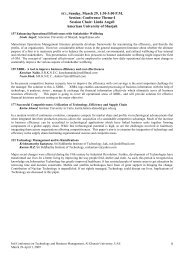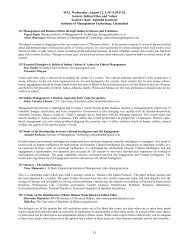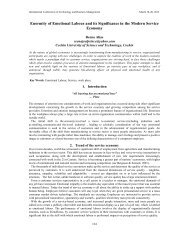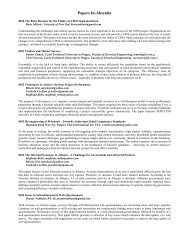Contributed Papers - Icmis.net
Contributed Papers - Icmis.net
Contributed Papers - Icmis.net
You also want an ePaper? Increase the reach of your titles
YUMPU automatically turns print PDFs into web optimized ePapers that Google loves.
1C-2, Saturday, January 1, 2:30-3:50 P.M.<br />
Session: OR/OM Models<br />
Session Chair: Mona Shah<br />
National Institute of Construction Management and Research<br />
8344 Planning Annualised Hours<br />
Sureshkumar M R, National Institute of Technology, sureshmullanezhy@gmail.com<br />
Madhusudanan Pillai V, National Institute of Technology, vmp@nitc.ac.in<br />
Seasonal demand for staff in service industry can be met using annualised hours (AH) labour contract. Under AH, contracted<br />
working hours are irregularly distributed per year. Such contracts are used for greater labour flexibility and enhanced efficiency<br />
for organisation. AH permits companies to adapt capacity to fluctuations in demand, thus reducing overtime, temporary workers<br />
and inventory costs. This paper presents two categories of models using Annualised Hours. Mixed Integer Linear Programming<br />
models (MILP) are in the first category and Linear Programming models (LP) in the second. A comparison of models using<br />
MILP and LP methods is also explained.<br />
8368 Machinery Improvements in the Life Cycle of a Textile Printing<br />
Kirti Arekar, K.J. Somaiya Institute of Mnagement Studies & Research, deshmukh_k123@yahoo.com<br />
Hirak Bhayani, Mumbai University, hirak1988@hotmail.com<br />
Bijal Chheda, K.J. Somaiya Institute of Mnagement Studies & Research, bijal.chheda@gmail.com<br />
One of the major problems in manufacturing is to reduce cost. To do so various activities such as Total Productive Maintenance<br />
(TPM), Total Quality Management (TQM), Industrial Engineering (IE) and Just-in-Time (JIT) are often carried out. Increased<br />
global competition has augmented the importance of total productive maintenance (TPM) in obtaining and maintaining a<br />
competitive advantage. More and more organizations are seeking proactive tools such as TPM to enhance their competitive<br />
position. The paper focuses on how machineries can be optimally utilized minimizing cost and hence reducing life cycle cost<br />
(LCC).<br />
8433 Specialised MBA Programmes in India – A Growing Trend in Indian Management Education in India<br />
Jonardan Koner, National Institute of Construction Management and Research, Koner_123@yahoo.com<br />
Mona N. Shah, National Institute of Construction Management and Research, mnshah@nicmar.ac.in<br />
A trend observed around the world and increasingly so in India in the past decade and a half is that of the mushrooming of<br />
specialised MBA programmes. This paper aims at understanding the ‘demand’ side factors that affect the choice of specialised<br />
MBA programmes vis a vis general management. A sample of 175 students pursuing such courses has been surveyed and using<br />
regression analysis the most prominent factors have been identified. These are, continued focus towards a specific sector, family<br />
background, MBA degree's status value, and ease of placement.<br />
8565 An Efficient Algorithm for Least-Cost Scheduling for Projects<br />
Bhausaheb Kharde, Pune University, khardebr@yahoo.com<br />
Gahininath Vikhe Patil, Pune University, principal@avcoe.org<br />
Time-Cost Trade-off in Projects, Least-Cost Schedule or crashing technique is double beneficiary technique for managers:<br />
decreasing project duration as well as total cost! Unit Time Method (UTM) is the powerful procedure for crashing; yields always<br />
optimum solution and is used widely for CPM <strong>net</strong>works. But much iteration is needed to get to optimum solution. We present<br />
new algorithm which works on UCM logic but requires few iterations. Algorithm can be viewed as modified Unit Time Method<br />
and yields the optimum in less iteration (10 to 30%).<br />
9014 Cost Estimation Based on Reusability of Product<br />
Manilal Amipara, Babaria Institute of Technology, md_ami@yahoo.co.in<br />
Shivprakash Agrawal, Babaria Institute of Technology, sagrawal@ijoqm.org<br />
To optimize resource utilization, the reusability and sharability is very important aspect for any product. This leads to think on<br />
innovative ways to design a process or product which can be reused or shared for different purposes or projects. Reusability or<br />
sharing could be technology, process, product or component of product. It becomes more important for products for which<br />
reproduction cost is negligible. This paper emphasis on estimating manufacturing cost based on possible sharing/ reusing of a<br />
product.







